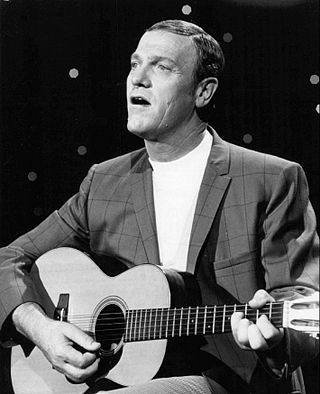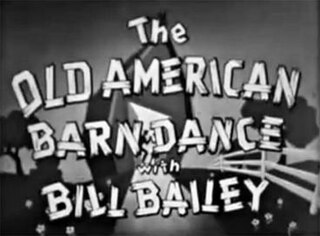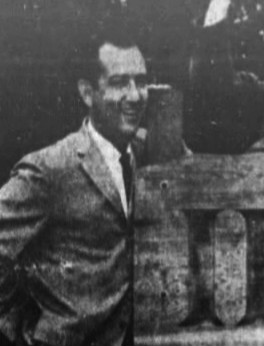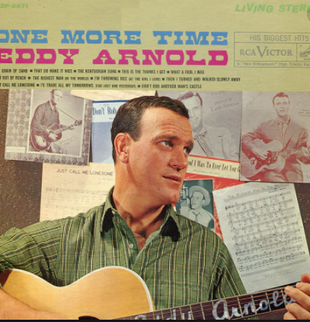
Chester Burton Atkins, also known as "Mr. Guitar" and "The Country Gentleman", was an American musician who, along with Owen Bradley and Bob Ferguson, helped create the Nashville sound, the country music style which expanded its appeal to adult pop music fans. He was primarily a guitarist, but he also played the mandolin, fiddle, banjo, and ukulele, and occasionally sang.

The Grand Ole Opry is a weekly live country-music radio broadcast from – and a several-nights-per-week performance held at – the Opry House in Nashville, Tennessee. It was founded on November 28, 1925, by George D. Hay as a one-hour radio "barn dance" on WSM. Currently owned and operated by Opry Entertainment, it is the longest-running radio broadcast in U.S. history. Dedicated to honoring country music and its history, the Opry showcases a mix of famous singers and contemporary chart-toppers performing country, bluegrass, Americana, folk, and gospel music as well as comedic performances and skits. It attracts hundreds of thousands of visitors from around the world and millions of radio and internet listeners.

The Lawrence Welk Show is an American televised musical variety show hosted by big band leader Lawrence Welk. The series aired locally in Los Angeles for four years, from 1951 to 1955, then nationally for another 16 years on ABC from 1955 to 1971, followed by 11 years in first-run syndication from 1971 to 1982. Repeat episodes are broadcast in the United States by Public Broadcasting Service (PBS) stations. These airings incorporate an original program—usually, a color broadcast from 1965 to 1982—in its entirety. In place of the commercials, newer performance and interview clips from the original stars and/or a family member of the performers are included; these clips are occasionally updated.
Ozark Jubilee is a 1950s United States network television program that featured country music's top stars of the day. It was produced in Springfield, Missouri. The weekly live stage show premiered on ABC-TV on January 22, 1955, was renamed Country Music Jubilee on July 6, 1957, and was finally named Jubilee USA on August 2, 1958. Originating "from the heart of the Ozarks", the Saturday night variety series helped popularize country music in America's cities and suburbs, drawing more than nine million viewers. The ABC Radio version was heard by millions more starting in August 1954.

Richard Edward Arnold was an American country music singer. He was a Nashville sound innovator of the late 1950s, and scored 147 songs on the Billboard country music charts, second only to George Jones. He sold more than 85 million records. A member of the Grand Ole Opry and the Country Music Hall of Fame, Arnold ranked 22nd on Country Music Television's 2003 list of "The 40 Greatest Men of Country Music."
Shindig! was an American musical variety series which aired on ABC from September 16, 1964 to January 8, 1966. The show was hosted by Jimmy O'Neill, a disc jockey in Los Angeles, who also created the show along with his wife Sharon Sheeley, British producer Jack Good, and production executive Art Stolnitz. The original pilot was rejected by ABC and David Sontag, then executive producer of ABC, redeveloped and completely redesigned the show. A new pilot with a new cast of artists was shot starring Sam Cooke. That pilot aired as the premiere episode.
The Foggy River Boys was the name of two related American male singing quartets from southern Missouri specializing in Southern gospel, spiritual, and country music in the 1940s and 1950s.

Clyde Julian "Red" Foley was an American musician who made a major contribution to the growth of country music after World War II.

"You Don't Know Me" is a song written by Eddy Arnold and Cindy Walker in 1955. "You Don't Know Me" was first recorded by Arnold that year and released as a single on April 21, 1956, on RCA Victor. The best-selling version of the song is by Ray Charles, who took it to number 2 on the Billboard Hot 100 chart in 1962, after releasing the song on his number 1 album Modern Sounds in Country and Western Music. The first version of the song to make the Billboard charts was by Jerry Vale in 1956, peaking at number 14 on the pop chart. Arnold's version charted two months later, released as an RCA Victor single, 47–6502, backed with "The Rockin' Mockin' Bird", which reached number 10 on the Billboard country chart. Cash Box magazine, which combined all best-selling versions at one position, included a version by Carmen McRae that never appeared in the Billboard Top 100 Sides listing.
Betty Johnson was an American traditional pop and cabaret singer who reached her career peak in the 1950s.
Charles Randolph Grean was an American producer and composer.
Stu Davis was a Canadian singer, songwriter, storyteller and musician. Davis was inducted into the Canadian Country Music Hall of Fame in 1993.

The Old American Barn Dance is an American country music television series carried by the DuMont Television Network from July 5 to September 13, 1953.
The Eddy Arnold Show is the name of three similar American network television summer variety programs during the 1950s hosted by Eddy Arnold and featuring popular music stars of the day. It was also the name of a radio program starring Arnold.

Don Cusic is an American author, songwriter and record producer who is best known as a historian of U.S. popular music. He is the author of 28 books, most of them related to country music; they include biographies of performers like Eddy Arnold, Roger Miller, Merle Haggard and Gene Autry. He is a special correspondent for Billboard magazine, a book reviewer for MusicRow magazine, and editor for trade magazines Record World and Cashbox . Cusic was a consultant for Ken Burns' documentary miniseries Country Music. He is a Curb Professor of Music Industry History at Belmont University in Nashville, where his former students include Brad Paisley and Chris Young. He is a frequent contributor of liner notes for prominent recording artists and has contributed various encyclopedia entries, magazine articles, and book chapters.

"Then You Can Tell Me Goodbye" is a song written by John D. Loudermilk. It was first released in 1962 by Don Cherry, as a country song and again as a doo-wop in 1967 by the group The Casinos on its album of the same name, and was a number 6 pop hit that year. The song has since been covered by Eddy Arnold, whose version was a number 1 country hit in 1968, and by Neal McCoy, whose version became a Top 5 country hit in 1996.

Roy Wiggins, known professionally as Little Roy Wiggins, was an American steel guitarist who is best known for his work with Eddy Arnold. Wiggins began playing professionally at a young age. As Eddy Arnold's first hire, he developed a signature "ting-a-ling" sound that helped make Arnold the most popular country entertainer for a period. As Arnold moved towards pop music, Wiggins' instrumental work was faded to the background, and then dropped entirely. Wiggins then made several solo instrumental recordings, and toured with other country musicians. Late in life he played for tourists in Tennessee.

Hank Locklin Sings Eddy Arnold is a studio album by American country singer–songwriter Hank Locklin. It was released in June 1965 via RCA Victor Records and was produced by Chet Atkins. The project was Locklin's tenth studio album and one of several concept albums he made during his career. The album was a collection of cover songs first recorded by Locklin's musical inspiration, Eddy Arnold. It included some of his biggest hits and most well-known songs. The collection received mixed reviews from critics and publications.

One More Time is an album by American country music singer Eddy Arnold. It was released in April 1962 by RCA Victor. The album is a "collection of songs he made famous the first time around."












